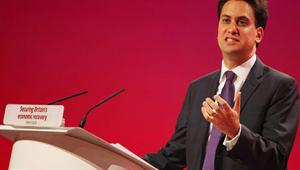Miliband said the major institutions – Royal Bank of Scotland, Lloyds Banking Group, HSBC, Barclays and Santander – needed to be broken up to create two new firms, as part of moves to tackle the country’s cost-of-living crisis. Following bailouts in the financial crisis, the UK government is the largest single shareholder in both RBS (82%) and Lloyds (40%).
In a speech at Senate House in London, the Labour leader said the cost of living crisis, with bills rising faster than wages, was the ‘single greatest challenge our country faces’.
He added: ‘This year the forecasts say that average wages will finally overtake prices. Let’s hope that happens.
‘But I really warn this government: if they think a few months of better statistics will solve this crisis, they are just demonstrating again that they have absolutely no idea about the scale of the problem or the solutions required.’
Banking reform was needed so that institutions served the real economy and the country was able to ‘earn our way to a higher standard of living’, said Miliband.
‘We need a reckoning with our banking system, not for retribution, but for reform. But to really change our banking system, we have to tackle a decades-long problem in British banking: too much power concentrated in too few hands.
‘On day one of the next Labour government, we will ask the Competition and Markets Authority to report within six months on how to create at least two new sizeable and competitive banks to challenge the existing high street banks.’
He said this would move past the question of whether new banks should be formed to determining how they would be.
A future Labour government would also introduce a law restricting the total market share banks can have in both personal accounts and business lending.
Comparing the policy to his pledge to introduce an energy price freeze announced at last year's Labour Party conference, Miliband said: ‘Only if we take on powerful vested interests, from energy to banking, and reform broken markets, can we make the long-term changes Britain needs.’
Responding to the speech, financial secretary to the Treasury Sajid Javid claimed the financial crisis was caused by the last Labour government, of which Ed Miliband was part.
‘This government is fixing the banking system to make it safer. But the only way to ensure a more financially secure future for people who work hard and for their families is to continue working through David Cameron’s long-term economic plan – reducing the deficit, creating jobs, cutting taxes, giving young people the skills they need to get on and fixing the welfare system so that it pays to work.’
The CBI commented that new entrants were already coming to the banking market without existing banks being ‘artificially’ carved up.
Chief Policy Director Katja Hall said: ‘The direction of travel in banking to increase choice and competition is positive, with several new players arriving on the scene, boosted by seven-day switching and a simpler authorisation system for new banks.
‘More can always be done, but imposing arbitrary caps on market share is too simplistic.’




















